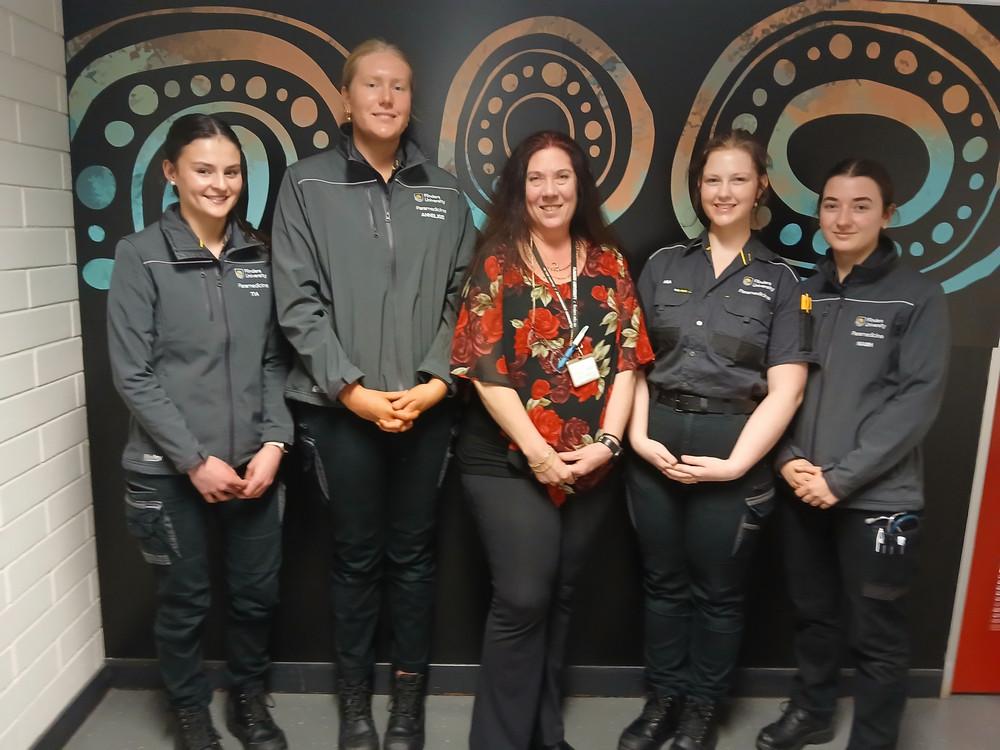- 2nd Sep 2024
PEARLS of wisdom: Flinders University paramedicine students launch research group to bridge data gaps

Adelaide/Tarntanya, Kaurna Country
When a group of first-year Flinders University paramedicine students embarked on their Contemporary Approaches to Lifestyle Management course, they soon found that there was a dearth of relevant research from which to draw upon.
“We had to basically research about what life as a paramedic is and how it affects our mental and physical wellbeing and how we can find ways to manage it and have a longer-lasting career in paramedicine by processing our emotions. But there was just not a lot of information out there to research. We often had to quote journals about nurses rather than paramedics,” said student Mia Rowlands.
With the aim of bridging the research gaps, last semester they banded together to form the PEARLS Research Group: Paramedic Education and Research Led by Students under the guidance and tutelage of Dr Elizabeth Goble, Research Advisor at the university’s College of Medicine and Public Health.
The five-member PEARLS team – comprising Mia, Niamh James-Preet, Tia Dahlitz, Annelise Janssen, Kyra Quilliam – decided to focus their attention on dissociation as a coping strategy and are working towards publishing a scoping review of the available literature.
“This was the logical place for us to start to see what's actually out there, and as we educate ourselves as to what is out there and what isn't out there, we'll then be able to identify where the greatest need is and which methodology is going to be the best one to use,” Dr Goble said. “I'm teaching research we as we do it, and as soon as we take our training wheels off, I'm sure we'll go down many different avenues.”
The group meets weekly and collectively divvies up research tasks.
“So far we're talking about what databases to use to look into the research that's out there and what hasn't been written and what has been written. We’ve divided up the different databases between us, and we're all doing a search, and then we come back once a week and discuss what we found, what we should change about it, if we had any luck with finding anything, and what we may need to improve in our searches or change so that we can find more or more specific research,” Mia said.
Their research journey is one they all aim to continue throughout their undergraduate degrees, and one they hope will benefit all paramedics, as well as open up a potentially different career pathway in academia in the future.
“We all want to help people, and when we started doing the research for our other subjects, we found out there was a big gap, especially in the mental health of paramedics,” Tia said. “I think doing studies like this can better equip everyone, even if it's just a little bit of insight about how we can manage it better - just helping the whole paramedic community with the mental health side of things.”
“Paramedics give so much to other people and we want to give something to paramedics as well,” Niamh said.
Importantly, the initiative is helping to remove the inherent fear that exists among many students in relation to undertaking research and making the research process not only more accessible, but also a lot of fun.
“There was an element of making it achievable,” Dr Goble said. “Research is not this far away, scary sort of thing, even professors and associate professors don't have to be scary people to talk to. We don't trip over our egos here, we're all very inclusive.
“When we sat down and talked about the frustration of the lack of research, we said, hey, there's us. We can do it. And why not? It takes the fear away and we've had fun, and we're developing skills. It's going to benefit everyone all round.”
More from Education
- National Rural Health Student Network is helping to build future health workforce for regional communities
- Rural Health Careers Promotion Programme is inspiring students in outlying Aotearoa communities
- Central Queensland University - Australasian College of Paramedicine-sponsored awards
- EOIs open: Pre-employment Program for graduate paramedics
- Hato Hone St John’s Paramedic Training Support Programme provides pathway to bachelor degrees for EMTs and EMAs
News Categories
- All
- General (38)
- Jobs and opportunities (140)
- Registration (9)
- Research (131)
- Opportunities (33)
- Position Statements (15)
- College news (244)
- Board (19)
- Ahpra News (12)
- Advocacy (114)
- Media Releases (23)
- College in the Media (28)
- Submissions (8)
- 50th Anniversary Stories (9)
- Rapid Response Updates (9)
- Feature Articles (16)
- Paramedic practice (11)
- Education (20)
- Sector news (8)
- Response editions (1)

Share this news